Back-up goalkeepers: What is life on the bench really like?
- Published
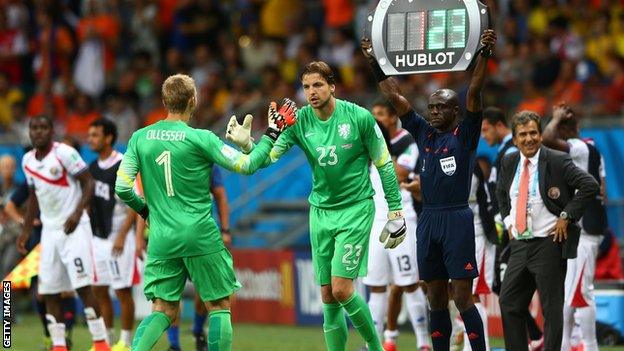
Tim Krul was brought on during extra time of the Netherlands' 2014 World Cup quarter-final against Costa Rica and saved two penalties in the shoot-out
Back-up goalkeepers have an easy ride, don't they? Fast cars and big houses bought with footballer's wages despite rarely, if ever, actually playing a game.
Clubs need them on the bench every match, ready to be called upon if the first-choice gets injured, is sent off or has a howler, but more often than not they keep the bench nice and cosy for the rest of the squad.
According to Opta, a sub goalie was used only nine times in last season's 380 Premier League games - that's a meagre 2.3% chance of a second-choice keeper appearing to the watching world.
But what is it actually like to be a reserve goalkeeper, when some think you are stealing a living?
"It is a big role, but you almost feel a bit guilty at times, because you don't feel like you're contributing," former Watford and current Brentford keeper Richard Lee told BBC Sport.
The 32-year-old would know better than most, having been first choice for only three and a half of his 14 seasons in football.
"Most footballers are driven and want to play. I don't think there are any number two goalkeepers out there loving life.
"It's more of a feeling of frustration, guilt and discontentment, and you also get self-doubt and a lack of confidence.
Famous back-up goalkeepers |
|---|
Stuart Taylor: The former Arsenal and Aston Villa goalkeeper has made a total of 92 first-team appearances to date, an average of six games per season since his debut in 1999. |
Carlo Nash: Between 2007 and 2014, Nash played a total of 13 games in spells at Wigan, Stoke (twice), Everton and Norwich. |
Richard Wright: Joined Premier League champions Manchester City in 2012, but is yet to play a game. |
Tony Warner: Began his career at hometown club Liverpool and made the bench 120 times but never played a first-team game. |
Iker Casillas: Despite legendary status at Real Madrid, he was dropped during their 2013-14 league campaign, but was a regular in the Real side that won the Champions League and regained his league place this year. |
"It's a dangerous role at times because you can get into a real comfort zone and it's not that fulfilling, but I realise it's an important role."
Lee has only played one match this season - August's League Cup penalty shoot-out win at Dagenham, which came after a dramatic 6-6 draw.
That shoot-out - in which he saved two penalties - was a brief high in recent years. He was on the bench the day the Bees won promotion to the Championship last season.
"It's weird [being a reserve keeper]. The team win games and you don't feel that buzz," he said.
"You're happy for the lads, they're friends of yours and you want them to do well, but you go home and it doesn't really mean anything. If you play in a big game and win, you might not get to sleep until four in the morning."
While Lee has been a back-up most of his career, many sub keepers are youngsters trying to make their way in the game.
One fresh-faced number two is Hartlepool's Jon Maxted, who had been on the bench over 100 times for boyhood club Doncaster by the age of 21 without getting on the pitch.
"You do get a little bit frustrated, but I was only a young lad," the 22-year-old said. "I had Neil Sullivan, Gary Woods and Ross Turnbull to look up to and you learn from them anyway.
"You train every day but it's just waiting for your opportunity, the same as anyone else.
"I work as hard as any other player out there on the pitch. Obviously they're playing games and I'm on the bench, but during the week I'm doing my hardest to get that place in the first spot."
In a bid for game experience, loans to lower-league sides offer an opportunity for youngsters.
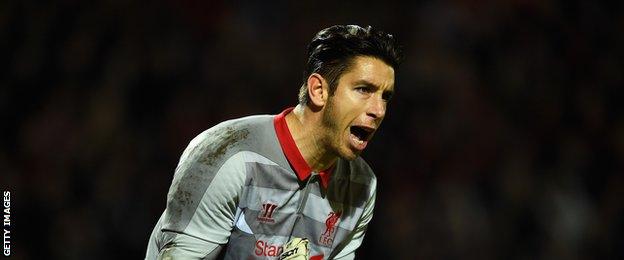
With Simon Mignolet out of form, regular back-up Brad Jones (pictured) has been given a run in Liverpool's first team
Carl Ikeme knows the system well, having used loans with eight different clubs as a springboard to finally hold down a first-team place at Wolves two seasons ago, at the tender age of 26.
Despite their major influence on his career, those temporary stints were rarely an alluring experience.
"It was tough. You're in a bed and breakfast all on your own away from your family trying to create a career for yourself," the 28-year-old, whose loan deals have taken him to Accrington and Stockport, said.
"It's not all glitz and glamour, especially when you're playing Conference football, but looking back it gave me the mental toughness to try and play at a higher level.
"It sounds so simple, but when you're at home you have a routine with your food. In a hotel you only have limited options and it's not always the healthiest. It's little things like that which don't seem like a lot, but when you're striving for something, it can be off-putting."
Loan spells can be beneficial in the short term, but back-ups still have to force their way past the number one when back with their parent club.
Surely they would hope the other keeper suffers a nasty injury or drops a clanger to get a chance?
"I wouldn't say you 'hope', but there is an awareness that there are only certain ways you can get into a team," said Lee. "If a number one is playing well, no matter how you are training, you aren't going to get into the team. The only way you can get in is injury, a sending-off, loss of form or a transfer.
"You never wish anything bad on anyone else, but you are aware when a keeper does make a mistake that this could be your route back in."
Lee made 92 league appearances during seven seasons at Watford, but a mistake in the Championship play-off semi-final against Hull in 2008 left him considering his future in football.
He decided to "not be that 40-year-old guy in the pub telling his mates 'I could have, should have, would have'", and moved down a division to then-League One Brentford in 2010., external
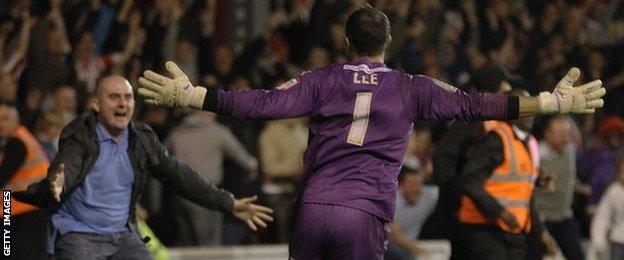
Richard Lee has built a reputation of being a 'penalty killer' - including in a League Cup shoot-out against Everton in 2010 for Brentford
It proved to be a smart move. He played 75 times in his first two seasons at Griffin Park, but injury and the form of those around him have kept him away from regular league action since 2012.
"Part of me did become used to being a number two. It's an easy role," said Lee, whose injury problems have all but resigned him to retiring at the end of the season.
"You are out of the firing line, there's no massive highs, there's no massive lows. Training is fun, it's a great form of exercise, and you can become used to doing it.
"When you eventually do get an opportunity, there is more at stake. But on a day-to-day level, it's not overly difficult."
- Published14 April 2014
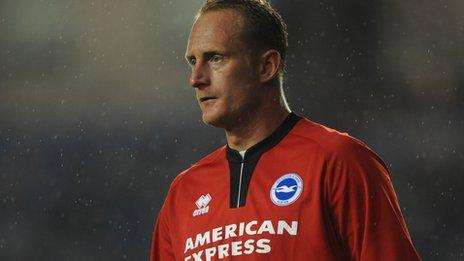
- Published21 November 2014
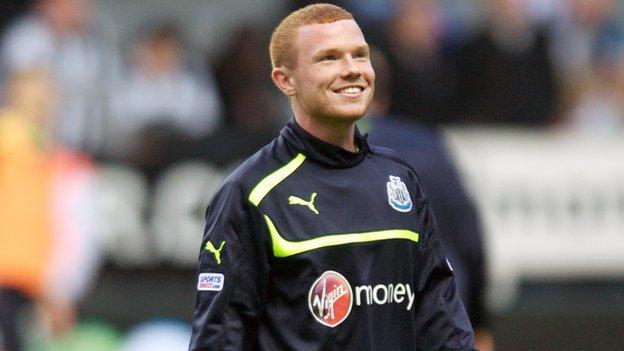
- Published26 June 2014
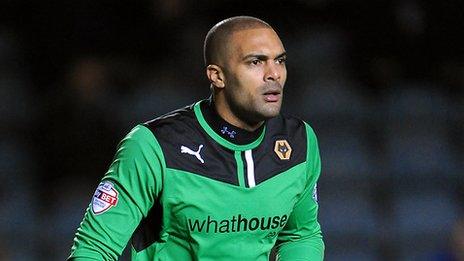
- Published20 June 2016

- Published7 June 2019

- Published2 November 2018
